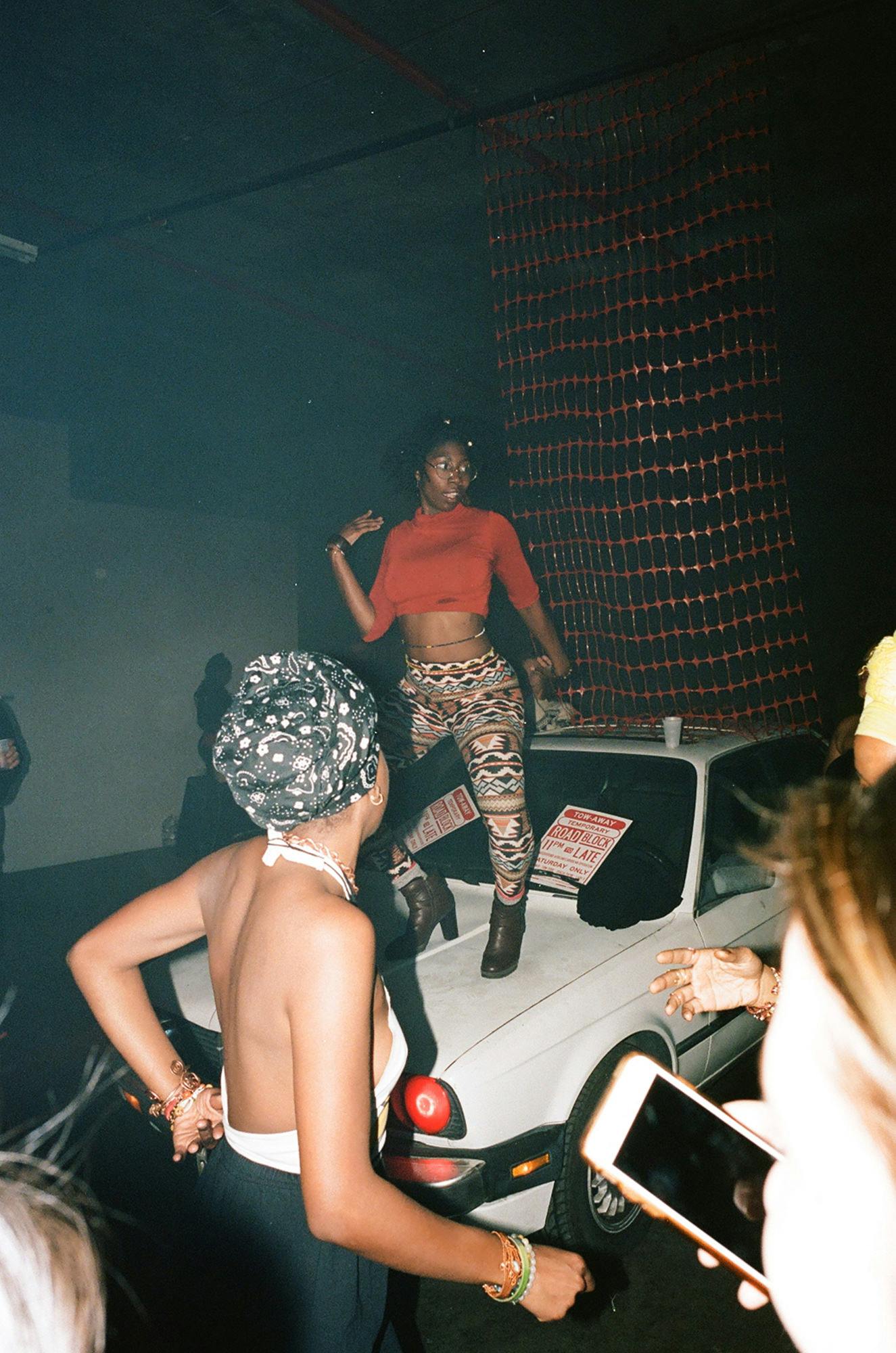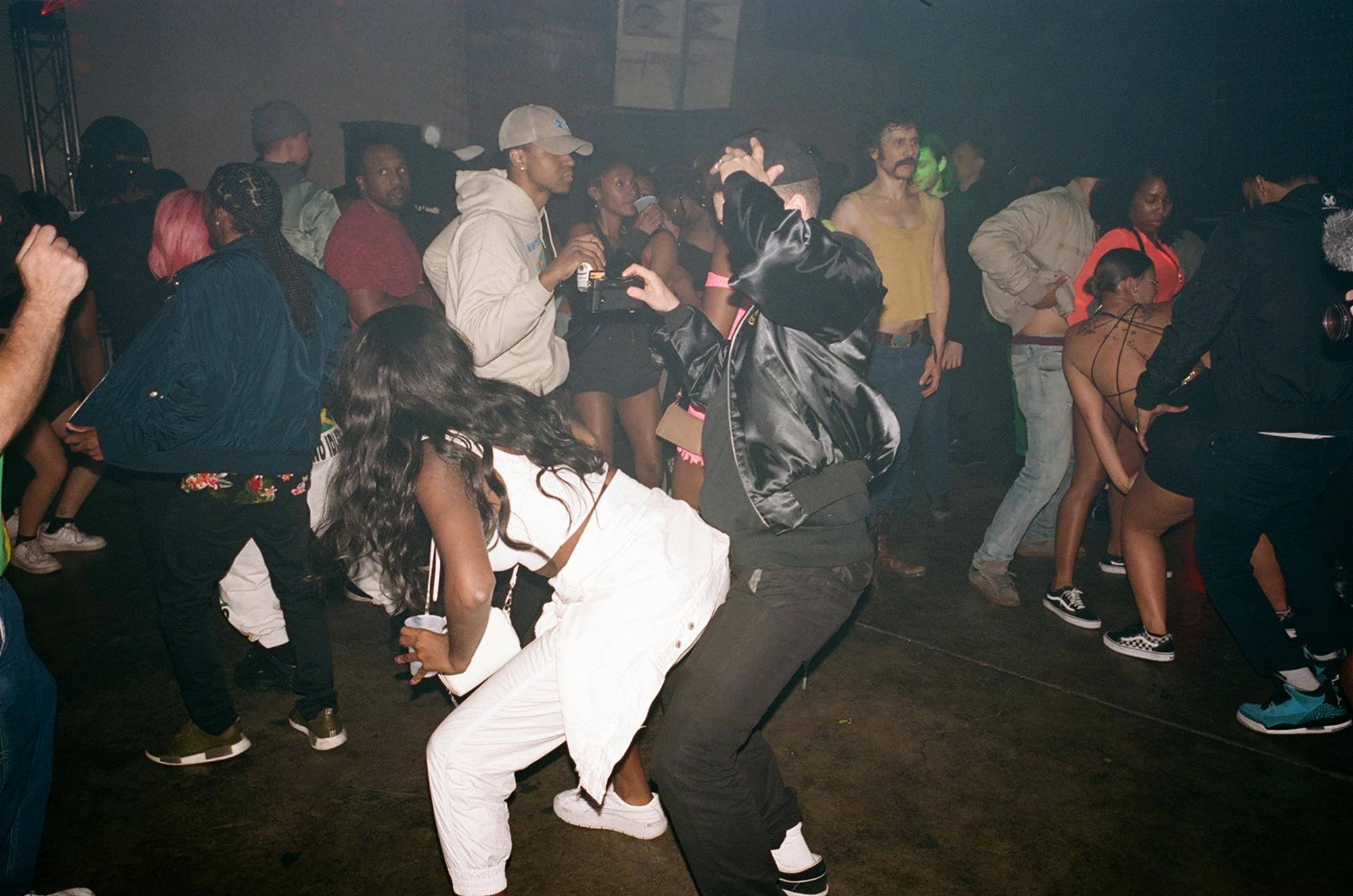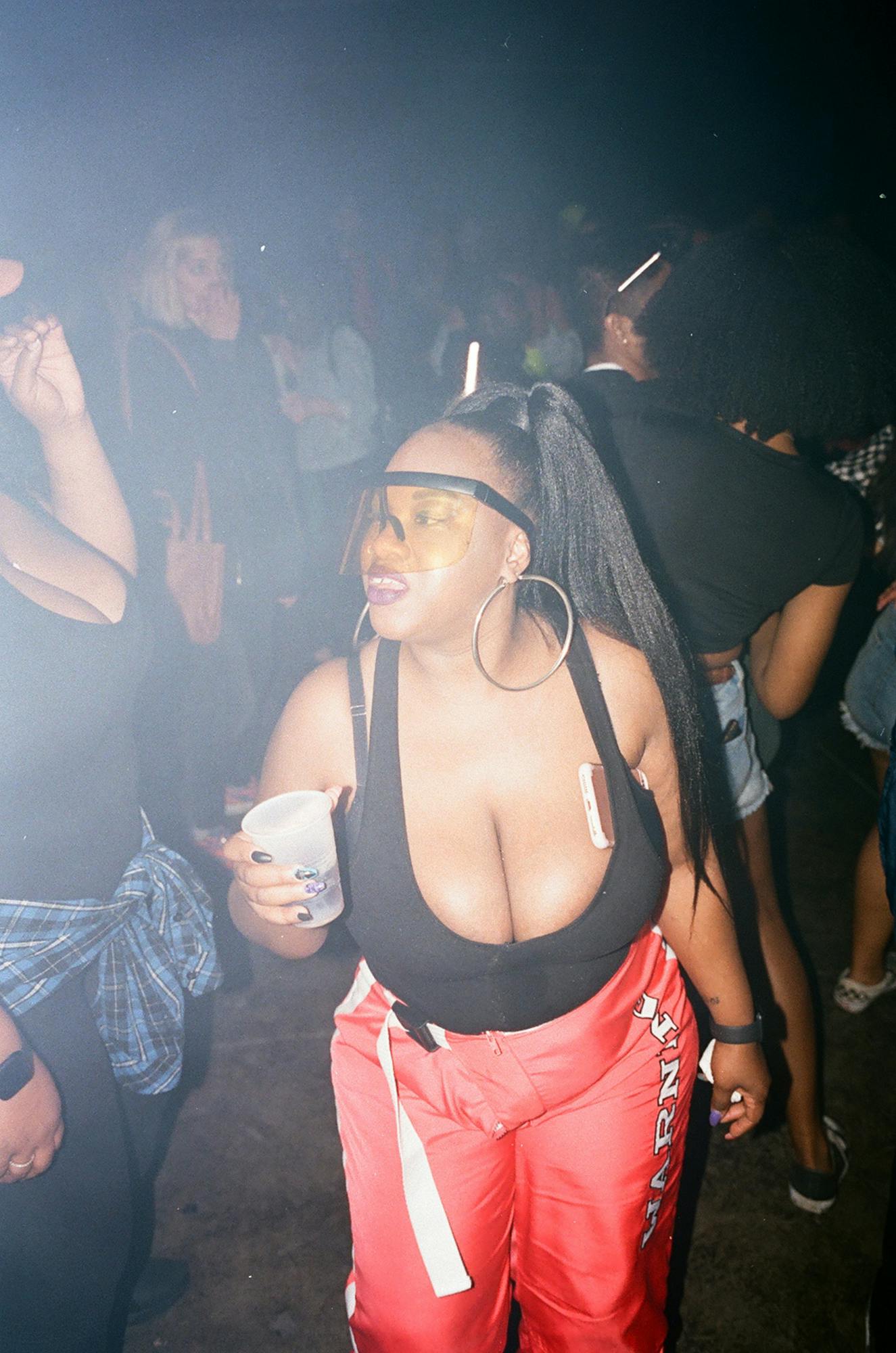
FOREIGNER
Why You Loved Last Night: Los Angeles
Words by
Apryl Fuentes
Photos by
Azha Ayanna
It started with a birthday—a birthday in Trinidad. Adam Cooper gathered some friends and family and threw himself a party. He played a bunch of his favorite tracks, on a borrowed controller, for his first unofficial set.
Adam, a.k.a. foreigner, is a Swiss knife of innovation, single-handedly teaching himself how to DJ and go on to produce some of LA’s most memorable Afrodiasporic events. As I sat with him on the eve of Roadblock™, his latest underground Afro/Caribbean operation, Adam shared some memories with me of growth between cities and the impact this had on his identity. Born in Trinidad and Tobago, raised in Caracas, Venezuela then NYC, the moniker, foreigner, speaks to the multiplicity of his experiences traversing the map.
It is important to note that I write this as a non-black person, invited into Adam’s remembrance of his own black experience dispelling the notion that blackness is monolithic. Sharing reflections of his childhood in Caracas, followed by Brooklyn and NYC, Cooper uninhibitedly recalled the anti-blackness surrounding him and his family in Venezuela specifically. He grappled with questions of identity early on in boyhood, struggling to make sense of this racist mistreatment by his peers and those around him. New York City provided a safe haven of cultural connection where he could finally relate to the many diasporic identities within the city itself. In the early 2000s, Cooper studied International Business and Marketing at Howard University, where he noticed how fragmented black identity was, amongst the student body, different from his formative years in NYC. This would later influence what would become foreigner—an all-encompassing creative avenue for the multidisciplinary Adam Cooper.

Fast forward to 2012 in a downtown LA apartment, where foreigner came to be. It was at these studio parties that Samantha Blake Goodman a.k.a. Muñeka and DJ Kelman Duran asked him to be a part of their project Rail Up—a now well-known Afro-Caribbean/Latinx dance party. Yet, foreigner didn’t stop there and began to orchestrate his own events centering the essential Trini fête. foreigner approaches parties with pure artistry and intentionality, utilizing spaces like blank canvases for experience. Los Angeles’ Caribbean scene is divided across the city, from Leimert Park to South Central, never truly entering the realm of foreigner’s visions for a party. Meanwhile, the contemporary art scene, which he is also a part of, doesn’t stray far from electronic music into the black immigrant experience. Events like Play™, Junkyard Jouvert, and his most recent Roadblock™, are his way of bringing people together in one space with the common goal of cultural ownership and pride.
“The way my philosophy is evolving, I really want to center people from the diaspora, specifically people behind the scenes and behind the decks. Oftentimes in the underground scene, you hear Afrodiasporic music, but you’ll seldom see black people playing it. It just hit me at a certain point that there are so many talented black people in LA that create and play the music that inspire me, that are only limited to mainstream platforms, which are very scarce in LA. In other words, the club scene is very network driven.”
Rhythm is the root of all music. The African diaspora is the root of rhythm.
Rhythm is the root of all music. The African diaspora is the root of rhythm.
Rhythm is the root of all music. The African diaspora is the root of rhythm.
Red haze emitted from the headlights of a white ‘79 BMW 3 Series, bouncing up and down with each whine from a dancer atop. Crowded yellow and white coupes filled the warehouse, juxtaposed with ceiling high scissor cranes, as attendees mounted car hoods, dancing on seats and trunks. Roadblock™ turned out the night with dancehall, soca, and Afrobeat favorites from local DJs Shacia Päyne, Lady X, Tomi Tribe, and foreigner himself. Eleven seemed rather early for the night ahead, with the warehouse filling up as 1am approached. People were pulling motorsport looks and neon fishnet ‘fits at this indoor block party.
High energy never faltered once amongst the crowd, as sounds flowed into each other, starting with Belizean filmmaker and DJ extraordinaire, Lady X’s dancehall and soca heavy set. This set was followed by producer Tomi Tribe’s Afrobeat edits and numerous hits. In that moment, the party was beyond a late night, accessible warehouse gig. Under a freeway underpass, this could have been Lagos or Kingston, or somewhere in the Islands. foreigner’s sonic curation resulted in an atmosphere of togetherness through shared freedoms and comfortability that a-cultural events do not create.
“There’s a different energy or a vibe when you look to the booth and see a black femme up there, and not necessarily opening up the night.”

Red haze emitted from the headlights of a white ‘79 BMW 3 Series, bouncing up and down with each whine from a dancer atop. Crowded yellow and white coupes filled the warehouse, juxtaposed with ceiling high scissor cranes, as attendees mounted car hoods, dancing on seats and trunks. Roadblock™ turned out the night with dancehall, soca, and Afrobeat favorites from local DJs Shacia Päyne, Lady X, Tomi Tribe, and foreigner himself. Eleven seemed rather early for the night ahead, with the warehouse filling up as 1am approached. People were pulling motorsport looks and neon fishnet ‘fits at this indoor block party.
High energy never faltered once amongst the crowd, as sounds flowed into each other, starting with Belizean filmmaker and DJ extraordinaire, Lady X’s dancehall and soca heavy set. This set was followed by producer Tomi Tribe’s Afrobeat edits and numerous hits. In that moment, the party was beyond a late night, accessible warehouse gig. Under a freeway underpass, this could have been Lagos or Kingston, or somewhere in the Islands. foreigner’s sonic curation resulted in an atmosphere of togetherness through shared freedoms and comfortability that a-cultural events do not create.
“There’s a different energy or a vibe when you look to the booth and see a black femme up there, and not necessarily opening up the night.”
Shacia Päyne kept it going, headlining with ‘90s dancehall and the deepest Jamaican cuts, for which she is best known. Mysta Crooks, acting MC, gassed the crowd up as Päyne delivered. Passion, release, and excitement carried us deep into the night, with nobody weary that dawn approached. It was nearly 4am when foreigner played to a loving crowd of his eclectic supporters, as all members of the diaspora and underground communities met in movement. After that night, I can’t say that any party I will go to can surpass what I experienced there, thanks to the talent and extreme joy surrounding me.
Adam Cooper is humble in admitting intentions to evolve his craft and contributions to his community. For foreigner, his visions exist beyond one party, it is his desire to provide space for carefree, black joy, and re-contextualize diasporic unity, that make all his ideas boundless. This is an effort that won’t end and he wants you to see what he’s coming up with this year. Chances are you might not know what to expect.
foreigner is now,
foreigner is here,
foreigner is there,
foreigner forever.





